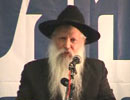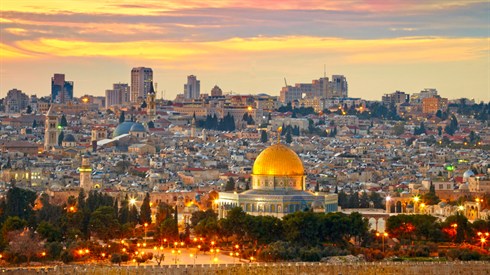The Torah study is dedicatedin the memory of
R' Meir b"r Yechezkel Shraga Brachfeld
5820
A - The Mitzvah of Settling the Land: The mitzvah of settling the Land of Israel requires Am Yisrael to conquer Eretz Yisrael, as it is written: "And you shall dispossess the inhabitants of the Land, and dwell in it, for I have given you the Land to possess it (Bamidbar 33,53)". It also is written "For you shall pass over the Jordan River to go in and possess the Land which the Lord your G-d gives you, and you shall possess it, and dwell in it (Dvarim 11,31). According to the Ramban's fourth mitzvah, this is for all times and every generation. The Shulchan Aruch (Even Ezra siman 75), and the Pitchei Tshuva 106 agree with the Ramban on this halachah. The mitzvah of settling the Land of Israel even takes precedence over pikuach nefesh (the saving of one's life even if it involves transgressing a mitzvah from the Torah). Settling the Land of Israel is a mitzvah of such great importance that, at times, Am Yisrael is obligated to engage in war for the sake of conquering or settling or maintaining control over the Land, even though Jewish lives will probably be sacrificed as a result. Therefore, if the nation is commanded to conquer the Land at such a great cost, that much more so is Am Yisrael expected and obligated to always rule over every part of it and protect if from being divided up or handed over to foreign nations.
B - Pikuach Nefesh: The Talmud in the tractate of Eruvin (45,a) and the Shulchan Aruch (orach chaim 329,6) explain that giving away any part of the Land of Israel to the enemy, even a small concession, invites an even greater risk and danger to both Israel and the Jewish nation. It is, therefore, permitted to transgress the Sabbath and even to put Jewish lives at risk in order to fight enemies that come to steal straw and chaff from a border town in Eretz Yisrael. For if they were allowed to steal chaff and straw the country's deterrent forces would be weakened, leaving the towns in a more vulnerable position and thus endangering many lives. It is clear that safeguarding all of the Israel is of a must and it is prohibited to relinquish any part of the Land (This will be further expanded on in halacha 12).
C - They Should not Dwell in Your Land: In addition to the mitzvah of settling the Land, the Torah further commands that "They shall not dwell in thy Land" (Shemot 23,33). The Rambam ruled (Hilchot Avoda Zara 10,6) that when the Land is under strong Jewish rule nobody should be allowed to dwell in Israel who is not a "Ger Toshav" (a non Jew that keeps the seven mitzvot of Noach). There are differing opinions on the definition of a Ger Toshav. Some of the Rabbinical authorities think that a non-Jew who accepts upon himself to follow the seven laws of bnei Noach in front of a court with complete faith in Hashem is considered to be a Ger Toshav, and therefore allowed to live in the Land even when it is under strong Jewish rule. Others believe that if the non-Jew does not commit idolatry and does follow the seven laws, even though he doesn't commit to them before a court of law, he is considered a Ger Toshav and is therefore allowed to live in the Land. According to this opinion it is permissible for non belligerent Muslims to reside in the Land of Israel, for they do not practice idolatry. However, those Arabs who are enemies to am Yisrael do not keep the seven laws of bnei Noach for they deny the G-d of Israel, and they transgress the forbidden law "Not to kill" by supporting murderous terrorists and not judging them properly. And so, it is forbidden to allow the belligerent Arabs who do not practice the seven laws to remain in the Land even during the time of a strong Jewish presence and rule. Even more so is it prohibited to give these enemies of Am Yisrael such an inheritance whereby more and more non-Jews who do not abide by the seven laws of Noach will continue to multiply.1
D - One Should Not Show Mercy: One should not show mercy to the non-Jewish residents that live in Eretz Yisrael as it says: (Devarim 7,2) "Thou shalt not make a covenant with them, nor show them any mercy." The wise sages explained that this is the completion of the prohibition "They should not dwell in your Land," which is the nation's obligation to enforce. Each individual Jew is, however, responsible for enforcing the prohibition to showing mercy. It is forbidden to sell fields or houses in Israel to non-Jews that do not keep the seven laws of bnei Noach. It follows, therefore, that it is forbidden to give any Arab that is not considered a Ger Toshav any part of Eretz Yisrael.2
E - The Prohibition of Ever Selling Any Part of the Land: The Torah clearly states in Vayyiqra (25,23) "The Land shall not ever be sold, for the Land is mine." The Ramban learns from this verse that it is forbidden to sell any land or house to non-Jews because the sold items will not be returned at the time of the Yovel (every fiftieth year when land is returned to its original owner) (Ramban mitzvah lo ta'asay 227). An even greater prohibition is to give away any of the Land promised to Am Yisrael by Hashem.
F - Evicting a Jew from His Home: No king or government has the right to evict a Jew from his home in Israel. This is because Hashem gave Eretz Yisrael to the Jewish nation, and every Jew basically owns part of the Land. Thus, no government or kingdom has the right to steal any inheritance or property that was legally purchased or built. Therefore any agreement that is based upon uprooting Jews from their homes is forbidden.3
G - Profanation of Hashem's Name: As long as the nations of the world side with Am Yisrael's enemies and pressure Am Yisrael to give up parts of the Land there is a chance that the Jewish leaders of Israel may do just that, which is a profanation of Hashem's Name as well as the mitzvah to sanctify Hashem and to resist any foreign coercion against the Jewish religion. (This will be explained in halacha 13).
12 - The Prohibition of Relinquishing Land to Ememies as a Result of Pikuach Nefesh
The basis for the prohibition of relinquishing parts of Eretz Yisrael can be found in the tractate of Eruvin (45,a) in the sugia that deals with laws of Shabbat in connection to pikuach nefesh. As previously explained, it is permitted to transgress the Sabbath in order to save another's life. However, one can not desecrate the Sabbath in order to rescue money or something that has monetary value. Therefore, the wise sages declared that if non-Jews come in order to steal money on the Sabbath, it is forbidden to take up arms in order to drive them off because there is no pikuach nefesh involved. However, this law only applies to cities that are not near the border. If the non-Jews come to a border city in order to take by force materials such as chaff and straw then there is the obligation to desecrate the Sabbath and take up arms to drive them away. The reason for this exception is that if today they are allowed to steal the chaff and straw from the border towns and cities, then tomorrow they will come to kill and to pillage, also in many other cities. The Shulchan Aruch brings this down as a halacha (orech chaim 329,6).
The wise sages realized that if we concede to the non-Jews in places close to the border even for such trivial material such as chaff and straw, the end result will be to increase their appetite and their desire to conquer our inheritance. It is, therefore, clear that Am Yisrael is forbidden to surrender any part of the Land to non-Jews, especially Judea and Samaria and the Golan, which are considered border towns. For just as it is forbidden to forfeit anything in the border towns, it is forbidden to give up those towns themselves in order to prevent the non-Jews desire to take over more land, which would eventually and inevitably lead to war.
If all the military experts were to announce that by relinquishing land we would achieve true peace, we could possibly declare that the times have changed and surrendering land no longer endangers lives. However this is not the case and many of the experts feel that abandoning Judea and Samaria poses a great peril to the State of Israel. Therefore we are only left with the words of the wise sages who brought down to us that it is forbidden to acquiesce to non-Jews even just chaff and straw, and certainly not the Land itself (this foundation was repeated many times by the late Lubatvicher Rebbe Rav Menchem Mendel Schneerson zt"l).
13 - The Prohibition of Relinquishing Land As a Result of the Profanation of Hashem's Name
The Rambam (Hilchot Yisodi Hatorah, chapter 5) clarifies that the mitzvah to sanctify Hashem's name in this world means that a Jew should be willing to sacrifice his life in order to sanctify Hashem's name. If, for example, non-Jews came and demanded a Jew to kill his friend or else he would be killed, it is incumbent upon him to die and not transgress the sin of murder. This is the halacha for all the three serious transgressions of adultery, murder, and idol worship. For after one transgresses one of these grave sins there is not much reason left to live and it is preferable for one to die rather than to continue to commit these sins.
The halacha is different regarding the rest of the mitzvot of the Torah. If a Jew was threatened with his life for not desecrating the Sabbath or eating pig then the Jew should eat pig and desecrate the Sabbath as "One should live by them (the mitzvot of the Torah) and not die by them." It should be understood, however, that this only applies when the non-Jews coerce the Jew for their own pleasure. If their motives are to convert the Jew or attack his faith and this is done in front of ten Jews, then it is incumbent upon that person to sacrifice his life. Such a situation no longer involves a personal transgression. It now becomes an issue of faith in the Torah and Hashem and, as previously mentioned, one is obligated to sacrifice his life for the sake of sanctifying Hashem's name.
Rav Tzvi Yehuda Kook zt'l instructed us that giving over the Land to non- Jews is within the realm of profaning Hashem's name and, therefore, the principle of "One should die and not transgress" apply. The Torah is filled with many promises that Hashem made to the Jewish people regarding their ownership of the Land of Israel. The Arab nations, many who do not even share a border with Israel, are basically fighting a war against the mitzvot of the Torah and the Jewish faith.
Giving away parts of Eretz Yisrael is the greatest level of blasphemy of Hashem's name because it is being committed by the nation as a whole. Any non- Jew that reads the Torah knows that Hashem promised the Land to Am Yisrael, and once he witnesses the Jewish nation giving away the Land and distancing itself from Hashem's promises, the greatest profanation of Hashem's name is committed. To avoid this profanation and blasphemy of Hashem's name the nation should be ready to sacrifice lives in defense of Eretz Yisrael, and in order to prevent the transgression of surrendering any parts of the holy Land that the Creator gave to Am Yisrael.
Although this mitzvah falls within the framework of "One should die and not transgress," there is no mitzvah to die for the sake of sanctifying Hashem's name if, regardless of whether Jews sacrificed their lives or not, the Land was to fall into the hands of the enemy. For the Land would be sacrificed at the same time as the lives were being sacrificed and that would surely be a profanation of Hashem's name. If, however, there is a chance of holding onto the Land, then it is obligatory to fight and sacrifice lives in order to prevent the transgression of relinquishing parts of Israel to a foreign nation. Blessed be Hashem for he has returned Am Yisrael to its Land and has given the Jewish nation the strength and ability to hold onto it. It is now Am Yisrael's obligation to guard this gift by all possible means.
14 - Government Decisions Which Oppose the Torah are Not Binding
As a general rule, according to the majority of Rabbinial authoriti, the laws legislated by the Israeli Knesset and Israeli government are to be accepted as the law of the Land ("Dina Dimalchuta Dina"), and those who live in Israel are obligated to abide by them (Rambam , Shulchan Aruch). Those who do not believe that this general rule applies to Eretz Yisrael (Ran) are considering the situation of the Land under foreign rule. If, however, Israel is under Jewish rule then the authority of Jewish government stems from the (Tuvai Ha'ir) local council leaders (see Tziz Eliezer 16, 50). There are those who believe that a Jewish government accepted by the Jewish nation has the authority of a Jewish kingdom and therefore any legislation made by that government concerning taxes, enactments, traffic laws, building permits and commerce are binding and obligatory to all who live in the Land.
If, however, the legislation opposes the Torah and its mitzvot, then one is required to abide by the Torah laws and not that of the government. Yehoshua ben Nun was a leader of the Jewish nation who had authority to make decrees, as it is written, "Whoever rebels against thy commandment, and will not hearken thy words in all thou doest command him, he shall be put to death: only be strong and of a good courage"(Yehoshua 1,18). According to this verse, in order for Yehoshua to make decrees, he was required "Only to be strong and very courageous and observe to do according to all the Torah, which Moshe my servant commanded thee: Turn not from it to the right hand nor the left that thou may prosper wherever thou go." (Yehoshua 1,7). If, however, his decree contradicts or opposes the Torah, then his law is considered null and void and one must not consider it (Sanhendrin 49,a). The Rambam also rules (Hilchot melachim 3,9) that if a king makes a law that contradicts the Torah, it has no binding value, because Hashem is the King of all kings.
These considerations involve a king who is appointed by a prophet and his rule is accepted by the Sanhedrin and the Jewish nation. It stands to reason that especially when there is no Sanhedrin or prophet; laws which are passed contrary to the Torah have no validity and should be considered null and void. It, therefore, follows that one is obligated not to heed to any governmental legislation that opposes the mitzvah of settling the Land of Israel.4
15 - The Prohibition of Participating or Assisting in Surrendering the Land
Not only is it forbidden to relinquish any part of the Land of Israel to non-Jews, but it is also prohibited to assist in the act of doing so, as Rav Goren tz"l, Rav Israeli tz"l, Rav Neria tz"l, Rav Tzvi Kook tz"l and Rav Avraham Shapiro shlit"a declared.
At the Rabbinical Council for Saving Eretz Yisrael, headed by the former chief Rabbi of Israel 5743-53 Rabbi Avraham Shapiro, shilta, the question was presented as to whether a military camp is considered the same as a settlement town in regards to surrendering it over to non-Jews. The Council answered this question in the month of Tamuz 5755: A) The Torah prohibits the giving over of military bases to foreign rule because it clearly nullifies the mitzvah of settling the Land as well as endangers Jewish lives. B) Regardless of where the army base is located within Israel, the mitzvah of settling the Land is being fulfilled just by its mere existence, as the Ramban wrote: " To conquer and not to abandon the Land to the non Jews", and if the army does decide to abandon the bases, then not only is it nullifying the mitzvah to settle the Land of Israel, but it endangers the existence of the state of Israel as well. C) A permanent army base is considered, by all means, the same status as a settlement town and, therefore uprooting it constitutes the same prohibition. D) It is, therefore, obvious and clear that it is forbidden for any Jew to partake or assist in uprooting settlements, military camps or installations, as the Rambam ruled (hilchot melachim 3,9) "Even if a king decrees that one should transgress a commandment from the Torah one should not listen to him."
---------------------------------
1. Although there are some Rishonim that hold that the commandment "They should not dwell amongst you" only applies to the 7 Canaanite nations (Rashi, Ra'avad and S'mag), most of the other Rabbis feel that the prohibition is for all the nations as the Torah explains "They should not dwell amongst you because they will cause you to sin". This misgiving applies to all the nations that are not reformed in their beliefs and habits. The major focus of their disagreement is on which nation to which this prohibition applies. According to the Rambam, Ravad, Magid Mishne, Minchat Chinuch and Ritba, a non- Jew who has been accepted by the beit din as a Ger Toshav, is permitted to live in Eretz Yisrael. The Kesef Mishne however disagrees and holds that anyone who keeps the seven mitzvot of Noach is considered a Ger Toshav and is permitted to live in Eretz Yisrael. The Mizbach Adama agrees with this opinion. Nevertheless the Arab nations that do not desist in their efforts to destroy Am Yisrael are not considered to be Ger Toshav, and the prohibition "They should not dwell amongst you" definitely applies to them.
The Christians who love and support the Jewish nation according to many of the Rabbis are considered to be within the realm of those that keep the seven mitzvot of Noach, and according to lenient opinions are allowed to continue to live in the Land. Their presence is obviously preferable to extremist Muslims who wish to destroy the Jewish nation. Although Christianity is considered by some to be idol worship, and Islam is not, there is basically no prohibition of worshipping both Hashem and idols for the non-Jew. Christianity does just that. In addition many of their present believers do not really investigate the foundations of their beliefs, rather what motivates them today is the customs that they inherited from their parents and intentions to worship Hashem. Rambam writes in his introduction to the tractate of Hulin that we need to judge them favorably (one should look at Rav Rabinovitz work Yad Pshuta Hilchot Avoda Zara 10,7 and Bmlumda Milchma page 145 that explains this method).
2. According to many Rabbinical authorities, amongst them Rav Kook, the prohibition "That they should not dwell amongst you" is equal to "Nor show them mercy", therefore the previous clarification of "That they should not dwell amongst you" also applies to "Nor show them mercy". However there are those Rabbinical authorities that take a more stringent viewpoint and hold that if there is room in halacha to allow one who keeps the seven mitzvot of Noach to live in Eretz Yisrael (this stems from the mitzvah "That they should not dwell amongst you"), there is no room in halacha to permit him to purchase land in Eretz Yisrael (this stems from the mitzvah "Nor show them mercy") until he is formaly declared by the Beit din as a Ger Toshav (Netziv).
3. The Rishonim went to great lengths to discuss if dina dmalchuta dina is also applicable to Eretz Yisrael. The Ran is of the opinion that dina dmalchuta dina is also kept outside of Israel, because there the country belongs to the king and one needs to be obedient to his laws and edicts. However Eretz Yisrael belongs to the Jewish nation and there is no halachic obligation to obey a government. Only when there exists a Jewish sovereignty that is considered halachically to have the same status as a king should one obey the laws. Rambam and the majority of the Rabbis hold that the law dina dmalchuta dina is always kept in Eretz Yisrael, because once the nation agrees to a certain type of government this gives those rulers the power to legislate and execute laws. However, according to the basis of the Ran (the Rashba explained in length) there is no disagreement that the government has no right to uproot Jews from their forefather's inheritance.
4. Rav Goren tz"l also decided (Gilion Rabbanai Yesha number 16) that according to the Rambam (Hilchot Malachim 1,4) and the Sefer Hachinuch (mitzvah 498) a government that relies on Arab vote in order to get into power has no validity as a government. This idea is on the condition that the majority of Jews do not support the government's decisions, thus the government has no right to establish or decree any laws that are concerned with the Jewish people or it's Land.

Keeping Kosher - Eating Out
Rabbi David Sperling

Roasted Foods on Pesach
Rabbi Daniel Mann | Nissan 12 5776
The Order of Amidah
Chapter Seventeen-Part Four
Rabbi Eliezer Melamed | 5775






